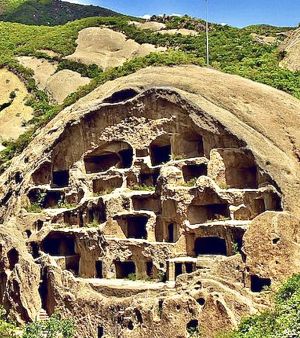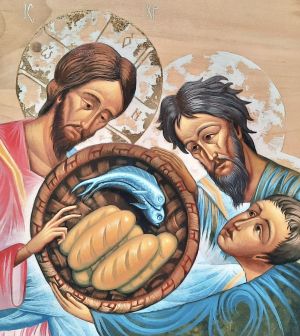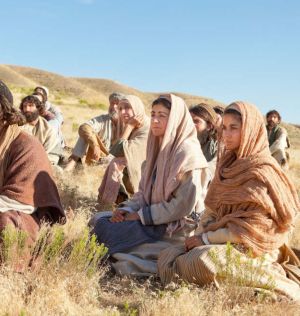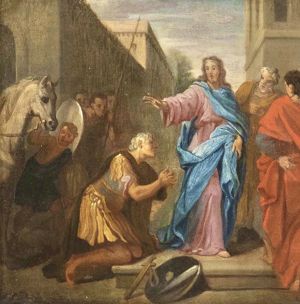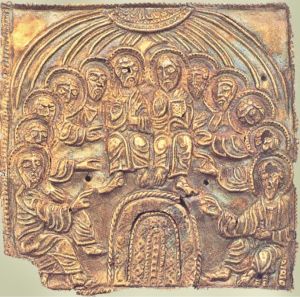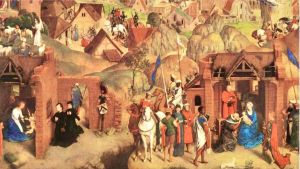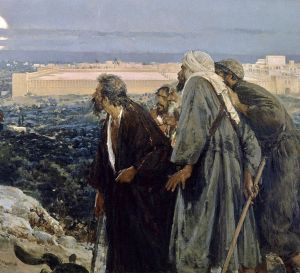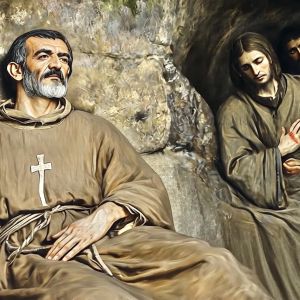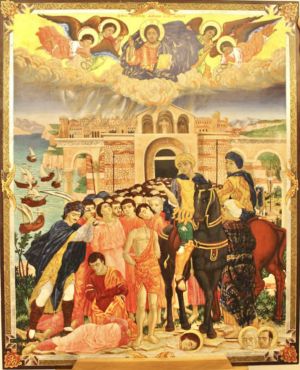
Teresa Girolami
Teresa Girolami è laureata in Materie letterarie e Teologia. Ha pubblicato vari testi, fra cui: "Pellegrinaggio del cuore" (Ed. Piemme); "I Fiammiferi di Maria - La Madre di Dio in prosa e poesia"; "Tenerezza Scalza - Natura di donna"; co-autrice di "Dialogo e Solstizio".
The man who often described himself as «simplex et idiota» had in fact understood well what it meant to live the Holy Gospel consistently and without going against his conscience.
Intense prayer and Grace, which never abandoned him, made him a faithful and wise listener, who built his inner home on the solid Rock of Christ.
The Sources, teachers of practical life, enlighten us in this regard:
"His highest aspiration, his dominant desire, his firmest will was to observe the Holy Gospel perfectly and always and to imitate faithfully, with all vigilance, with all commitment, with all the enthusiasm of his soul and heart, the doctrine and examples of our Lord Jesus Christ" (FF 466 - First Life - Celano).
Again:
"Two years before he gave up his spirit to God, after many and varied labours, divine Providence drew him aside and led him to a lofty mountain called Monte della Verna...
Here he began, as was his custom, to fast...
He rose to those heights not as an importunate scrutineer of majesty... but as a faithful and prudent servant, intent on seeking the will of God, to which he ardently desired to conform in everything" (FF 223 - Major Legend).
And he always recommended to his friars:
"Keep his precepts in the depths of your hearts and fulfil his counsels perfectly" (FF 216 - Letter to the whole Order).
Francis, in fact, a true lover and imitator of Christ, knew that «Not everyone who says to me, 'Lord, Lord,' will enter the kingdom of heaven, but only the one who does the will of my Father in heaven» (Mt 7:21).
Thursday, 1st wk. in Advent (Mt 7:21,24-27)
Jesus had told His disciples that, bound to Him like the branch to the vine, they would do greater things than those hitherto wrought by His Person.
Francis is one of those disciples through whom God was able to perform wonders.
Indeed, invested by the Spirit, we read in the Sources thus:
"A citizen of Fano named Buonuomo was a paralytic and leper. Taken by his parents to the church of Blessed Francis, he was cured of both diseases.
But a young man from San Severino, named Atto, who had his body all covered with leprosy, was also cured by the merits of the Saint, after having made a vow and visited his tomb" (FF 1312).
The crowd gathered around was healed.
Multiple healings took place through the work of his Servant.
But all this had a secret: Francis' unspeakable faith in the efficacy of the Word that transforms bread and wine into the Body and Blood of Christ.
Francis rested on such certainties.
The Sources offer us splendid passages where all the beauty of the Poverello's heartfelt love for the Eucharist appears: Bread of Life to be distributed to men.
"Behold, every day he humbles himself, as when from the royal seat he descended into the womb of the Virgin; every day he himself comes to us in humble appearance; every day he descends from the bosom of the Father onto the altar in the hands of the priest. And as to the holy apostles he showed himself in the true flesh, so also now he shows himself to us in the consecrated bread" (FF 144 - Admonitions).
And again:
"We know that there can be no body if it is not first sanctified by the word.
For nothing do we bodily possess and see in this world of the Most High Himself except the body and blood, the names and words by which we were created and redeemed 'from death to life'" (FF 207 - Letter to all clerics).
Yes, Bread of Life that feeds to satiety those who believe in Him who gave Himself entirely to us.
«I have compassion on the crowd, for [it is] three days that they remain with me and have nothing to eat, and I will not dismiss them fasting lest they fail in life» (Mt 15:32)
Wednesday 1st wk. in Advent (Mt 15:29-37)
«[...] He rejoiced in the Holy Spirit and said, 'I praise you, Father, Lord of heaven and earth, because you have hidden these things from the wise and the learned and revealed them to babes'» (Lk 10:21).
Jesus is the only one who can truly call the Lord of heaven and earth Father, but into this familiarity he introduces everyone.
Clare, seedling of the blessed Father Francis, with her special character of simplicity and littleness had achieved, by Grace, such a great familiarity with the Lord that she moved in total harmony with Him.
Consulting the Sources, in the Legend we read of the degree of intimate union of the Saint with the divine Bridegroom.
"How much strength and support she received in the furnace of ardent prayer, how sweet the divine goodness was to her in that fruition, is testified to by proven evidence.
For when she returned in the joy of holy prayer, she brought back from the fire of the Lord's altar burning words, such as inflamed the hearts of the sisters.
They noted with admiration that a certain sweetness radiated from her face and that her face seemed brighter than usual" (FF 3199).
In a letter to Ermentrude of Bruges* he recommends:
"Always be attentive and vigilant in prayer. Bring to its consummation the good you have begun, and fulfil the mystery you have embraced in holy poverty and sincere humility' (FF 2916).
Such was Clare, a simple and small creature, capable of rejoicing in every gift received, in every tiny reality that spoke to her of the Eternal.
"She welcomed with great joy the fragments of alms, the pieces of bread that the beggars brought back and, almost sad for the whole loaves, she was happy instead for those little pieces" (FF 3188).
A woman conformed to Christ in everything, she considered herself a nothing before God.
In her Testament she exhorted meekness and humility of heart, as a loving Mother:
"I still pray to her who will be in the government of the sisters, that she may endeavour to preside over the others more by virtue and holiness of life than by dignity, so that, animated by her example, the sisters may lend obedience to her, not so much because of the office she occupies, but out of love.
Let her also be provident and discreet towards her sisters, like a good mother towards her daughters [...].
Let her still be so affable and accessible to all that the sisters can confidently manifest their needs to her and have recourse to her at all times with confidence [...]" (FF 2848).
Meekness and humility: the stature of little ones, to whom the Mysteries of the Kingdom are revealed, finding consolation in loving with the sentiments of Christ.
*Ermentrude of Bruges: to her we owe the spread of the Order of the Poor Clares in Flanders.
Tuesday 1st wk. in Advent (Lk 10,21-24)
Power of the Word, even in distant lands - in Faith
Jesus draws attention to the operative power of the Word of God, even at a distance, where authentic Faith palpitates.
In this sense, an episode narrated by the Sources is symptomatic.
In conversation with Cardinal Ugolino (the future pope), faced with the latter's reproach as to why he had sent his friars to foreign lands and so far away, Francis, a man of profound faith in the Word of God, responds with a great outburst of spirit:
"Do not think, sir, that the Lord has sent the brothers only for the good of these regions.
I tell you in truth that God has chosen and sent the brothers for the spiritual benefit and salvation of the souls of men throughout the world; they will be received not only in the lands of Christians, but also in those of the infidels.
Provided they observe what they have promised the Lord. God will give them what they need in the lands of the infidels as in Christian lands" (FF 1638).
Here Francis manifested a solid and universal faith in the Word that works always and everywhere where it finds open doors and sincere reliance.
Clare of Assisi too, who grew up in the shadow of Saint Francis, a woman of clear and strong ideas, revealed a granitic faith in the Word of God whose saving and transforming power she sensed, so much so that she refused material support from the begging friars if Pope Gregory then decided to prohibit the friars from going to the Monasteries without prior authorisation.
Regretting the scarcity of the bread of the Word, she groaned and said:
"Take them all away from us now, the friars, after you have taken away those who gave us the nourishment of life!
As the Bride of the Canticle, Clare knew by direct knowledge what benefits her soul and those of her sisters had received for the healing of soul and body.
She, a woman enclosed in the secret of the Word, certain of its boundless efficacy, knew the transformation that had taken place at St Damian's through the power of the Word - which does not return to God before it has effectively worked what it desires.
«Truly I tell you, with no one in Israel have I found such faith!» (Mt 8:10).
Monday 1st wk. in Advent (Mt 8:5-11)
In the Gospel of this first Sunday of Advent, the underlying theme is that of being ready for the unpredictable Coming of the Lord, watching and waiting.
Francis of Assisi lived his entire life, beginning with his conversion, in a continuous act of vigilance for the arrival of the Beloved.
In the fraternity, he always sought to encourage his brothers in this direction.
In the Perugian Legend, we read:
"If the servant of God provides wisely for his body with good grace and as far as possible, and brother body shows himself to be lazy, negligent and sleepy in prayer, in vigils and in other good works of the spirit, then he must chastise him like a rebellious and indolent beast, which wants to eat, yes, but refuses to work and carry the load" (FF 1652).
His sons, who looked to the life that the Poverello led with great rigour, followed him.
"They afflicted their bodies not only with fasting, but with many vigils, suffering cold and nakedness and working with their hands.
Very often, in order not to remain idle, they went to help the poor people in the fields, sometimes receiving bread from them for the love of God. With these and other virtues, they sanctified themselves and the place of the Porziuncola. Other brothers who came later behaved in the same way for a long time, albeit with less austerity" (FF 1553).
At that time, the type of asceticism and spirituality practised was expressed in a rigorous way of life, but Francis always seasoned it with the salt of wisdom regarding his community.
Clare herself, a woman enclosed in the secret of God, lived in San Damiano "as a pilgrim and stranger in this world" (Reg. c. VIII,1), in a vigil abandoned to her Spouse, whom she awaited with diligent living.
Hers was an opening to a Presence that intoxicates the poor and humble heart with joy, in a prayer that is love 'in the secret of the Father'.
Chiara's life was lived in joyful penance and expectation, following the Gospel, in extreme poverty and Christian fraternity.
Like Francis, she became a trusted and prudent servant, placed at the head by the Lord to give food at the proper time (cf. Mt 24:45).
«Therefore, stay awake, for you do not know on what day your Lord is coming» (Mt 24:42)
First advent Sunday A (Mt 24:37-44)
The Gospel of the day insists: «be on your guard» and «stay awake, praying».
The Poor Man of Assisi, like the women of St Damian's, lived their existential parable in constant vigil and prayer, careful not to fall into lukewarmness.
In the Franciscan Sources there are episodes that eloquently underline these Gospel coordinates.
In Francis' Letters we find exhortations to the friars never to neglect prayer, the breath of the soul:
"Let us raise our praise and prayers to Him day and night, saying: Our Father, who art in heaven, for we must pray always without ceasing" (FF 188).
But there is a striking episode involving the Poverello:
"The Saint once came with his companion to a church far from the town.
Wishing to pray alone, he told his companion [...] Left alone, he addressed long and very devout prayers to God, and at the end he looked around to see where he could lay his head down to sleep.
But immediately troubled in spirit, he began to feel oppressed by fear and tedium and to tremble all over. He clearly felt that the devil was directing his attacks against him [...] He immediately got up and went outside, made the sign of the cross, and exclaimed:
'By Almighty God, I command you, demons, to pour out upon my body all that is in your power.
I will gladly endure it, for I have no worse enemy than my own body: thus you will do justice to my adversary and inflict punishment on him in my stead."
Those who had gathered to terrify his soul, encountering a spirit more ready than ever, even if in weak flesh, immediately fled in confusion and shame" (FF 707).
And St. Clare, in San Damiano, together with the sisters whom the Lord had given her, lived always attentive and vigilant in prayer:
"She used to wake the young girls for Matins, gently rousing them with gestures, and inviting them to praise God.
Often, while they were still asleep, she would light the lamps; often she herself would ring the bell.
There was no place in her monastery for lukewarmness, no place for sloth where laziness was shaken by a pungent impulse to pray and serve the Lord" (FF 3200).
Therefore: «be awake, praying» (Lk 21:36)
Saturday 34th week in Ordinary Time (Lk 21:34-36)
«You too will experience what is reserved». Franciscan Advent
What, does it not pass? The Kingdom is near: we are the bride and groom, brethren, mothers
Jesus invites all to discern the signs inherent in nature, to give criterion to the last ones. When the fig tree buds, the season of fruit is near.
Thus Francis, a true lover and imitator of Him, reads in his own life and that of his brothers the offshoots of the Kingdom of God that is approaching, before events that speak the language of the Creator Himself.
In the Sources we find passages that indicate the signs of the growth of every believer, like the tree that sprouts and produces fruit:
"We are spouses, when the faithful soul is united to our Lord Jesus Christ by virtue of the Holy Spirit.
We are his brothers, when we do the will of the Father who is in heaven.
We are mothers, when we bear him in our heart and body through divine love and pure and sincere conscience, we generate him through holy works, which must shine out to others as an example" (FF 168/2. Letter to the Faithful).
Well, «when you see these things happening, know that the Kingdom of God is at hand»!
Francis also reads in his illness and death the approaching Kingdom of God.
He raises his head and thus addresses his own:
"Then the Saint lifted up his hands to Heaven, glorifying his Christ, because he could go to Him without hindrance of any kind.
But to show that in everything he was a perfect imitator of Christ his God, he loved to the end his brothers and sons whom he had loved from the beginning [...].
Then, while all the brothers were around him, he stretched out his right hand over them and placed it on the head of each one, beginning with his vicar:
"Farewell," he said, "all you my sons, live in the fear of the Lord and keep yourselves in it always!
And since the hour of trial and tribulation draws near, blessed are those who persevere in what they have undertaken!
For I hasten to God and commend you all to his grace'.
And he also blessed all the brothers, wherever they were in the world, and those who would come after them until the end of the ages" (FF 806).
«When they have already sprouted, behold, by yourselves you know that summer is already near» (Lk 21:31)
Friday, 34th wk. in O.T. (Lk 21,29-33)
With the bread of tears, one banner would continue to soar
Today's Gospel tells of the ultimate signs foretold by Christ.
Francis, who had experience of signs, lived his earthly pilgrimage uninterruptedly directed towards the manifestation of Christ and thus working for the good of his brothers and sisters.
Everything would crumble and in the end a single banner would continue to fly: the Cross of Christ, the ultimate sign and victory of the Risen One.
In the light of all this, Francis seemed to contrast the signs that would be manifested in the moon, the sun, the stars, the anxiety of peoples in anguish... with the one sign around which Christian existence revolves: the Cross through which the world has been redeemed.
In the Sources, then, we find passages that explain and support what has been said.
"And we give you thanks, because your Son himself will return in the glory of his majesty to consign the reprobate, who did not do penance and did not know you, to eternal fire, and to say to all those who knew you and adored you and served you in penance: Come blessed by my Father, enter into possession of the kingdom, which has been prepared for you from the beginning of the world [...]" (FF 65).
And so Francis, the Minim "chose to live for all, rather than for himself alone, spurred on by the example of Him who deigned to die, He alone, for all men" (FF 1066).
And all this together with his brothers "concerned to refresh themselves more with the bread of tears than with the bread of abundance" (FF 1067).
Yes, there will be many signs in the universe at the full manifestation of Christ, but only one will stand undisturbed: his redemptive and transforming Holy Cross.
To his brothers, therefore, he taught:
"When you pray, say: Our Father, and: We adore you, O Christ, in all your churches that are in the whole world, and we bless you, because through your holy cross you have redeemed the world" (FF 1068).
«And there shall be signs in the sun, and in the moon, and in the stars, and on earth anguish of nations in bewilderment by the roaring of the sea and the waves» (Lk 21:25)
Thursday, 34th wk. in O.T. (Lk 21,20-28)
Today's Gospel passage speaks of persecution and hatred towards the witnesses of Jesus.
The Poor Man of Assisi, having known Christ, well knew that following in His footsteps would also entail insults and persecution, starting with his family.
In fact, the people of Assisi and his father, a shrewd merchant, could not bear his radical change, and thought him mad.
But Francis, Herald of Christ, did not let himself be intimidated, guided by divine Wisdom, which suggests to those who welcome it every response appropriate to the moment.
The Franciscan Sources, a place of special evangelical training, narrate:
"One day, inflamed with enthusiasm, the Saint left the cave and set out towards Assisi, lively, quick-witted and joyful.
Armed with confidence in Christ and inflamed with heavenly love, he reproached himself for cowardice and vain trepidation, and boldly decided to expose himself to the hands and blows of his persecutors.
At the first sight of him, those who knew him as he was before, began to insult him, shouting that he was a madman and a fool, throwing mud and stones at him.
Seeing him so changed, exhausted by penances, they attributed his change to exhaustion and dementia.
But the Knight of Christ passed through that storm without paying any attention to it, not allowing himself to be struck and agitated by the insults, giving thanks to God instead.
News of what was happening spread through the squares and streets of the city, until it came to the ears of his father.
Hearing how they were mistreating him, he immediately went out to get him, intending not to free him but to end it.
Out of his mind, he pounced on him like a wolf on a sheep, and staring at him with grim eyes and a face contracted in fury, he seized him and dragged him home.
There he locked him up in a dark cubbyhole for several days, doing everything, with words and blows, to bring him back to worldly vanity" (FF 1417).
But "Francis did not let himself be moved neither by words, nor by chains, nor by beatings. He endured everything with patience, indeed becoming more agile and stronger in following his ideal" (FF 1418).
«Now before all these things they will lay their hands on you and persecute you by delivering you to synagogues and prisons» (Lk 21:12).
«And you will be hated by all because of my name» (Lk 21:17).
Wednesday 34th wk in O.T. (Lk 21,12-19)
The Church was built on the foundation of the Apostles as a community of faith, hope and charity. Through the Apostles, we come to Jesus himself. Therefore, a slogan that was popular some years back: "Jesus yes, Church no", is totally inconceivable with the intention of Christ (Pope Benedict)
La Chiesa è stata costituita sul fondamento degli Apostoli come comunità di fede, di speranza e di carità. Attraverso gli Apostoli, risaliamo a Gesù stesso. È pertanto del tutto inconciliabile con l'intenzione di Cristo uno slogan di moda alcuni anni fa: "Gesù sì, Chiesa no" (Papa Benedetto)
Intimidated by the nightmare of demons and concrete dangers, the crowds could not see the possibility of emancipation from an existence of obsessions - slavish, frightened, lost, overwhelmed...
Intimidite dall’incubo di demoni e pericoli concreti, le folle non riuscivano a vedere possibilità di emancipazione da un’esistenza di ossessioni - pedissequa, spaventata, smarrita, sopraffatta…
Justification incorporates us into the long history of salvation that demonstrates God’s justice: faced with our continual falls and inadequacies, he did not give up, but wanted to make us righteous (Pope Francis)
La giustificazione ci inserisce nella lunga storia della salvezza, che mostra la giustizia di Dio: di fronte alle nostre continue cadute e alle nostre insufficienze, Egli non si è rassegnato, ma ha voluto renderci giusti (Papa Francesco)
Against this cultural pressure, which not only threatened the Israelite identity but also the faith in the one God and in his promises, it was necessary to create a wall of distinction, a shield of defence to protect the precious heritage of the faith; this wall consisted precisely in the Judaic observances and prescriptions (Pope Benedict)
Contro questa pressione culturale, che minacciava non solo l’identità israelitica, ma anche la fede nell’unico Dio e nelle sue promesse, era necessario creare un muro di distinzione, uno scudo di difesa a protezione della preziosa eredità della fede; tale muro consisteva proprio nelle osservanze e prescrizioni giudaiche (Papa Benedetto)
It is not an anecdote. It is a decisive historical fact! This scene is decisive for our faith; and it is also decisive for the Church’s mission (Pope Francis)
Non è un aneddoto. E’ un fatto storico decisivo! Questa scena è decisiva per la nostra fede; ed è decisiva anche per la missione della Chiesa (Papa Francesco)
Being considered strong, capable of commanding, excellent, pristine, magnificent, performing, extraordinary, glorious… harms people. It puts a mask on us, makes us one-sided; takes away understanding. It floats the character we are sitting in, above reality
Essere considerati forti, capaci di comandare, eccellenti, incontaminati, magnifici, performanti, straordinari, gloriosi… danneggia le persone. Ci mette una maschera, rende unilaterali; toglie la comprensione. Fa galleggiare il personaggio in cui siamo seduti, al di sopra della realtà
The paralytic is not a paralytic
Il paralitico non è un paralitico
The Kingdom of God is precisely the presence of truth and love and thus is healing in the depths of our being. One therefore understands why his preaching and the cures he works always go together: in fact, they form one message of hope and salvation (Pope Benedict)
Il Regno di Dio è proprio la presenza della verità e dell’amore e così è guarigione nella profondità del nostro essere (Papa Benedetto)
duevie.art
don Giuseppe Nespeca
Tel. 333-1329741
Disclaimer
Questo blog non rappresenta una testata giornalistica in quanto viene aggiornato senza alcuna periodicità. Non può pertanto considerarsi un prodotto editoriale ai sensi della legge N°62 del 07/03/2001.
Le immagini sono tratte da internet, ma se il loro uso violasse diritti d'autore, lo si comunichi all'autore del blog che provvederà alla loro pronta rimozione.
L'autore dichiara di non essere responsabile dei commenti lasciati nei post. Eventuali commenti dei lettori, lesivi dell'immagine o dell'onorabilità di persone terze, il cui contenuto fosse ritenuto non idoneo alla pubblicazione verranno insindacabilmente rimossi.


